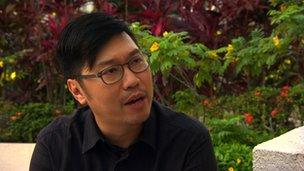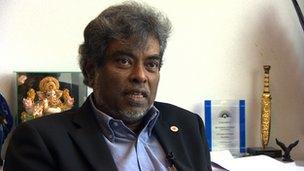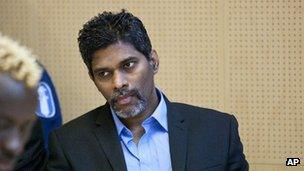Trailing Singapore's 'football match-fixing boss'
- Published
Italian police say this man is at the centre of fixing there, but living freely in Singapore
Somewhere in one of the world's least corrupt countries is a man accused of fixing hundreds of football matches around the world.
The authorities know where he is and have even invited him in for a chat.
But much to the frustration of European investigators, Dan Tan Seet Eng remains a free man and the Singaporean police seemingly powerless to act.
'Il boss'
Dan Tan, as he is more commonly known, has been closely linked to international match-fixing for more than two years. Aged 48 and of Chinese descent, there are just two known photographs of the Singaporean in circulation.
His name, on the other hand, repeatedly appears in court papers from the Italian "Calcioscommesse" match-fixing and betting scandal investigation.

Mr Ho (above) says Dan Tan should be seen more as a match "buyer" than a "fixer"
That investigation has been under way since 2011 and involves the rigging of games in Italy's lower divisions. So far, it has implicated scores of players, many of whom have been given bans and their clubs docked points.
In the papers from the court in Cremona, Dan Tan is referred to as "Il Boss", and it is claimed that he leads a huge fixing syndicate operating from his home in Singapore.
Extensive phone records were published between Singaporean numbers said to belong to Dan Tan and contacts in Europe.
According to the papers, Dan Tan had been using Eastern European fixers to make contact with players. These fixers are often former footballers or agents with established links to the modern game.
"Dan Tan probably pays the European match fixers about 200,000 euros ($260,200, £172,900) to fix per game," Stanley Ho, a Singapore Straits Times reporter who has investigated the fixers, said.
"He will then pass that information to illegal betting syndicates in China where they will have dozens of guys on laptops and computers and they will be clicking - live betting - all at the same time - on that particular game."
Ho says his research suggests that Dan Tan should be seen more as a match "buyer" than a "fixer".
The arranging of the match was being done by Europeans, he told me, and it was only when they had secured a possible fix that they would make contact with Dan Tan for the funds to achieve it.
Suspicious games
Much of the evidence against Dan Tan comes from a former associate, Wilson Raj Perumal.
A fellow Singaporean with a history of petty crime, Perumal's brazen acts of fixing moved beyond simply rigging games to include organising international friendlies featuring entirely bogus national sides.
Perumal's own fixing career came to a juddering halt in February 2011 when he fell out with Dan Tan and was arrested in Finland. A deal to buy the Finnish football club Rovaniemi had turned sour, and it is widely thought that someone tipped off the authorities.
In prison - first in Finland and then under house arrest in Hungary - Wilson Raj Perumal began to talk. The details he revealed became central to the cases that have now been made against Dan Tan in both Italy and across Europe.
A month ago, thanks in part to Perumal's testimony, European police forces presented a summary of their findings in The Hague.
Between 2008 and 2011, Europol said they had identified 680 suspicious games, of which 380 took place in Europe. The matches included World Cup qualifiers and the European Champions league.
Further details were withheld for legal reasons but blame for the fixing was placed firmly on Asian syndicates, and in particular, a group based in Singapore.
Thousands of miles to the east, this was deeply embarrassing for Singapore. It is normally a country that prides itself on being business-friendly and virtually corruption-free.
Free man
Football fans were now clamouring to know why a man alleged to have corrupted the world's favourite game on a massive scale was still at large.

Mr Anandan has represented some of the most notorious match fixers in court
I went to Singapore to try to find Dan Tan and also to discover from authorities why he had not been arrested.
I failed on both counts.
Dan Tan is still free somewhere in Singapore, but he has moved on from the apartment block which is listed as his residence.
Through a contact, it was established that he had no interest whatsoever in talking to the media or responding to the charges made against him.
So why then is Dan Tan still free? The Singaporean authorities were more accessible but just as unco-operative.
Neither the Ministry of Home Affairs, the Singaporean police or the country's anti-corruption agency would speak to me about match-fixing.
So I turned to one of Singapore's leading criminal lawyers, Subhas Anandan, for legal advice. In the past, he has represented some of the country's most notorious match-fixers in court.
Mr Anandan said that in fact the matter was quite simple.
There is no extradition treaty between Singapore and Italy, so it's impossible for Dan Tan to be simply handed over to the Italian authorities.
Action could only be taken against him if there was proof of wrongdoing in Singapore, he said.
"There is no evidence to say that he [Dan Tan] has committed any offence in Singapore. So you cannot do anything to him here in Singapore."
But there's no doubt that the Singaporean authorities are under intense pressure and feeling it.
Two weeks ago, Dan Tan and seven of his associates were brought in for questioning and then released a few hours later without charge.
Singled out
Days later, one of them, a former footballer from Slovenia named Admir Suljic, decided to fly to Milan.

Much of the evidence against Dan Tan is from former associate Wilson Raj Perumal
He was met in Italy by police officers and will face charges of sporting fraud in connection with the Calcioscommesse scandal.
Some have seized on Dan Tan's continuing freedom as proof that Singapore isn't interested in fighting football corruption.
It is a charge that the Singaporean authorities not surprisingly have rejected and they have been supported by the secretary-general of Interpol, Ronald Noble.
I spoke to Mr Noble at a conference on match-fixing in Malaysia. He said he believed Singapore had been unfairly singled out and that despite pointing fingers, Europol was not sharing the evidence it had gathered with the rest of the world.
"All police forces need to be permitted by law to co-operate internationally while their investigations are ongoing and not be required to wait until the investigation has been concluded and the trial has been concluded," he said.
There is little doubt that the match fixers' sophisticated inter-continental operations have put them a long way ahead of the rigid rule-bound tactics of those trying to stop them. Depressingly for football fans, it is not going to be easy or quick to change.
Many in Singapore are also doubtful as to whether Dan Tan really is quite as important as he has been made out to be.
They say he only became the focus of attention because his jailed associate, Wilson Raj Perumal, was arrested and became the only decent lead to those who fund the fixing that investigators have.
They say organised crime networks in China, Vietnam, Russia and elsewhere are also almost certainly involved in the rigging of matches.
"If the European fixers can sell the matches to Dan Tan," journalist Stanley Ho told me. "Don't you think they're calling other syndicates too?"
- Published21 February 2013
- Published20 February 2013